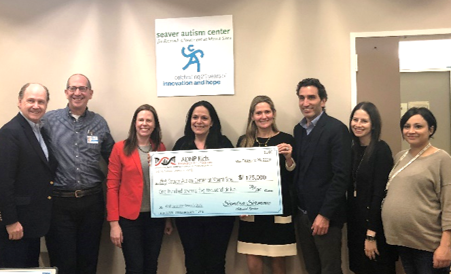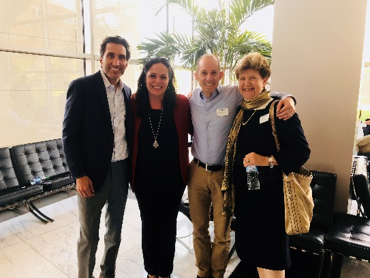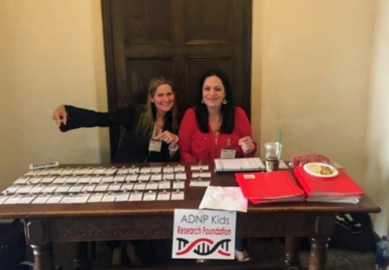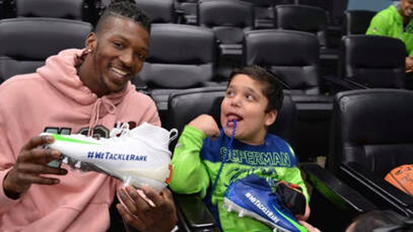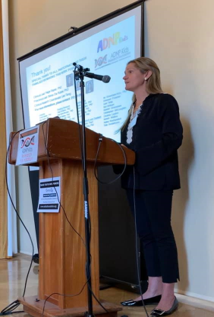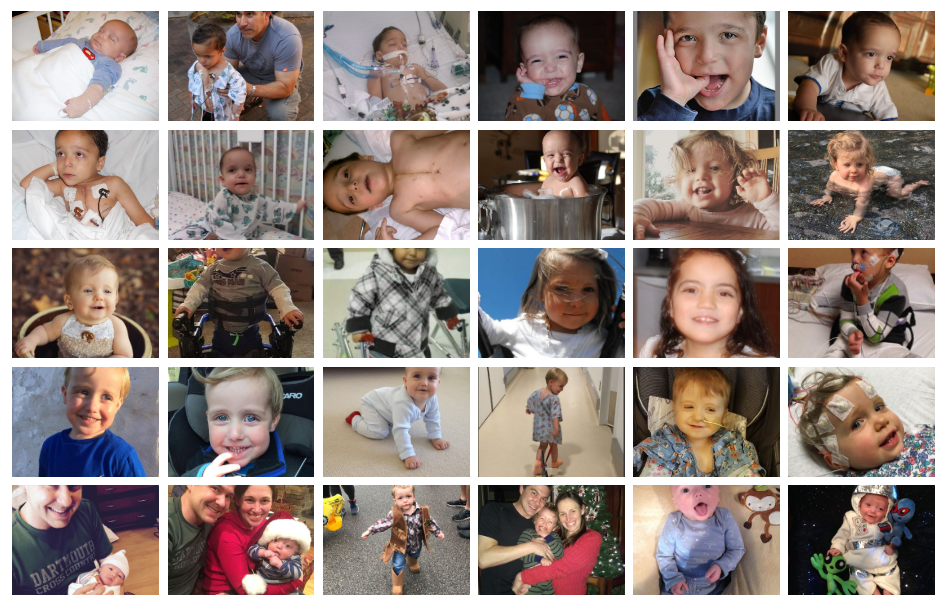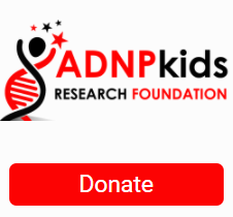2-5-19
FOR IMMEDIATE RELEASE:
Story for Rare Disease Day - February 29, 2020
FOR IMMEDIATE RELEASE:
Story for Rare Disease Day - February 29, 2020
Parents Find Glimpse of Hope For Treatment of Their Children's Rare Genetic Disorder Highly Linked to Autism.
SUMMARY:
Sandra Sermone and Genie Egerton-Warburton children both suffer from a rare disorder called ADNP Syndrome. These mothers are in a race to save their children and raise money to fund a drug trial for a new treatment that provides the first glimpse of hope, because currently, there are no treatments available and no cure. They have teamed up with Mount Sinai and want to spread awareness about this rare disorder and say that there could be thousands of children who have this genetic syndrome and these families have no idea because they have not had genetic testing. The good news is, these moms have found some very unique features that are actually quite easy to identify in children as young as 9-12 months old, so they are calling on the public's help to raise awareness. Why? Because they have two drugs in the pipeline that could help their children, and one was found quite remarkably. Just last week the FDA gave approval to begin the study, but if these moms don't find more families and raise the money needed to fund the study, they might not be able to help their children. So in honor of Rare Disease Day, they are on a mission to raise awareness of this rare genetic disorder, squash some of the inaccurate information floating around about causes of autism, and raise awareness of the importance of genetic testing and possibly help thousands of other children get diagnosed.
Sandra Sermone and Genie Egerton-Warburton children both suffer from a rare disorder called ADNP Syndrome. These mothers are in a race to save their children and raise money to fund a drug trial for a new treatment that provides the first glimpse of hope, because currently, there are no treatments available and no cure. They have teamed up with Mount Sinai and want to spread awareness about this rare disorder and say that there could be thousands of children who have this genetic syndrome and these families have no idea because they have not had genetic testing. The good news is, these moms have found some very unique features that are actually quite easy to identify in children as young as 9-12 months old, so they are calling on the public's help to raise awareness. Why? Because they have two drugs in the pipeline that could help their children, and one was found quite remarkably. Just last week the FDA gave approval to begin the study, but if these moms don't find more families and raise the money needed to fund the study, they might not be able to help their children. So in honor of Rare Disease Day, they are on a mission to raise awareness of this rare genetic disorder, squash some of the inaccurate information floating around about causes of autism, and raise awareness of the importance of genetic testing and possibly help thousands of other children get diagnosed.
These mothers have been featured on numerous news stories in the past, here are a few of the recent ones:
STORY PITCH:
Recent breaking news relevant to the story: Just last week, in the largest genetic sequencing study of autism spectrum disorder to date (CELL Journal), researchers identified 102 genes associated with risk for autism. The landmark study was led by Joseph Buxbaum, PhD, Director of the Seaver Autism Center for Research and Treatment at Mount Sinai, through an NIH-funded international Autism Sequencing Consortium. He calls it a “profound neurobiological advance”.
One of these genes, the ADNP gene, has been identified to be one of the top single genes related to autism and neurodevelopmental dysfunction in that report. A change in the ADNP gene causes a complex and rare disorder called ADNP Syndrome.
About one half of the genes outlined in this study cause genetic autism neurodevelopmental disorders that if diagnosed at an early age, can allow for much needed early intervention and lead to better lifelong outcomes. It can also open the door to treatment options that these families would not otherwise know about. These Mom's believe that by sharing their story about the unique features of ADNP syndrome, families sitting in their living rooms across the country watching will stop dead in their tracks and say, 'oh my God, this sounds just like my child'.
But the information on this study and the importance of genetic testing for some reason doesn't seem to get into the living rooms of the millions of families living with these complex disorders, and they have no idea that their child or family member could in fact have a genetic variant.
"We need these families to hear about some of these genetic disorders like ADNP syndrome, but in a way that they can understand and relate to, because most families don't sit around reading the 'CELL journal'. These families need to learn that a genetic mutation could be the actual cause of their child's Autism, as well as hundreds-of-thousands of cases of Autsim", says Sandra Sermone, one of the mothers working with Dr. Buxbaum. She goes on to say, "We need to get out there and tell America; 'hey, guess what', Autism isn't caused by lunch meat, caffeine or bad parenting, it’s not all vaccines; a huge and very unknown component of it is GENETIC, some of which are spontaneous gene mutations that occurred far before you had that Starbucks latte while pregnant”.
Dr. Buxbaum and his team at Mount Sinai, are currently working with Sermone and Egerton-Warburton, on the largest study of ADNP syndrome in the world, which began in 2018. Mount Sinai is also working on two novel treatment options for this autism related syndrome, all because of the drive and determination of these two moms. And they have just received great news, the FDA has just given Mount Sinai approval to move forward with a study for one of those treatments, and wait until you read how it was found!
There are thousands of undiagnosed children with ADNP syndrome and other Autism-related syndromes, and there are unique features of ADNP syndrome that are very easily identified, one is so simple, as simple as a smile! Children with ADNP syndrome have early erupting baby teeth, (link to announcement) and this is not seen in any other syndrome in the world, which in the world of genetics, is a huge deal! If a baby has a full mouth of baby teeth and developmental delays at one year old, they most likely could have an ADNP mutation, and it's that simple to identify, yet no one knows about it! These two moms want to change that because they believe this could help thousands of families could get answers for their child's autism, and this could lead them to a treatment that they never knew about.
Recent breaking news relevant to the story: Just last week, in the largest genetic sequencing study of autism spectrum disorder to date (CELL Journal), researchers identified 102 genes associated with risk for autism. The landmark study was led by Joseph Buxbaum, PhD, Director of the Seaver Autism Center for Research and Treatment at Mount Sinai, through an NIH-funded international Autism Sequencing Consortium. He calls it a “profound neurobiological advance”.
One of these genes, the ADNP gene, has been identified to be one of the top single genes related to autism and neurodevelopmental dysfunction in that report. A change in the ADNP gene causes a complex and rare disorder called ADNP Syndrome.
About one half of the genes outlined in this study cause genetic autism neurodevelopmental disorders that if diagnosed at an early age, can allow for much needed early intervention and lead to better lifelong outcomes. It can also open the door to treatment options that these families would not otherwise know about. These Mom's believe that by sharing their story about the unique features of ADNP syndrome, families sitting in their living rooms across the country watching will stop dead in their tracks and say, 'oh my God, this sounds just like my child'.
But the information on this study and the importance of genetic testing for some reason doesn't seem to get into the living rooms of the millions of families living with these complex disorders, and they have no idea that their child or family member could in fact have a genetic variant.
"We need these families to hear about some of these genetic disorders like ADNP syndrome, but in a way that they can understand and relate to, because most families don't sit around reading the 'CELL journal'. These families need to learn that a genetic mutation could be the actual cause of their child's Autism, as well as hundreds-of-thousands of cases of Autsim", says Sandra Sermone, one of the mothers working with Dr. Buxbaum. She goes on to say, "We need to get out there and tell America; 'hey, guess what', Autism isn't caused by lunch meat, caffeine or bad parenting, it’s not all vaccines; a huge and very unknown component of it is GENETIC, some of which are spontaneous gene mutations that occurred far before you had that Starbucks latte while pregnant”.
Dr. Buxbaum and his team at Mount Sinai, are currently working with Sermone and Egerton-Warburton, on the largest study of ADNP syndrome in the world, which began in 2018. Mount Sinai is also working on two novel treatment options for this autism related syndrome, all because of the drive and determination of these two moms. And they have just received great news, the FDA has just given Mount Sinai approval to move forward with a study for one of those treatments, and wait until you read how it was found!
There are thousands of undiagnosed children with ADNP syndrome and other Autism-related syndromes, and there are unique features of ADNP syndrome that are very easily identified, one is so simple, as simple as a smile! Children with ADNP syndrome have early erupting baby teeth, (link to announcement) and this is not seen in any other syndrome in the world, which in the world of genetics, is a huge deal! If a baby has a full mouth of baby teeth and developmental delays at one year old, they most likely could have an ADNP mutation, and it's that simple to identify, yet no one knows about it! These two moms want to change that because they believe this could help thousands of families could get answers for their child's autism, and this could lead them to a treatment that they never knew about.
STORY DETAILS:
Sandra Sermone from Washington and Genie Egerton-Warburton from New York, are two mothers working together to raise awareness and push research forward after their children were diagnosed with ADNP syndrome, a very rare and debilitating genetic syndrome caused by a mutation to the ADNP gene that was only discovered 5 years ago. Sandra's son Tony was the first child in the world diagnosed in 2014 after the syndrome was discovered and Genie's child was the 54th in the world.
They have devoted their lives to help improve the lives and challenges of their children’s rare disease. This supermom-duo dove headfirst into research, became experts, began studies, created a scientific network of specialists, built a nonprofit foundation and are maneuvering through the process of drug discovery and development, all in the last few years.
They say that the most important element to helping their children, and all children with autism, is getting children diagnosed and finding more patients. They have teamed up with Mount Sinai to advocate and encourage other parents to learn about the importance of genetic testing in children with autism and developmental delays.
Awareness is key, and Sermone and Egerton-Warburton want everyone to know that this rare disorder is not as rare as you might think. As noted above, in the study led by Dr. Buxbaum, ADNP was reported to be one of the top genes linked to autism and developmental delays. However, this rare disorder has only been diagnosed in 250 children worldwide.
But is it really that rare? Dr. Buxbaum doesn’t think so. He estimates that 1 in 20,000 could have an ADNP mutation causing autistic traits and developmental delays. Yes, I repeat, 1 in 20,000, so why are only 250 children currently diagnosed?
Why is important to know for this story? “Because there could be a potential drug in the near future that could help all of those children, but not unless they have genetic testing. ADNP syndrome also has some very unique traits in the children which is easily identified, but our story needs to be told so these parents around the country can see if this sounds like their child” says Sermone.
These two moms have played a key part in bringing the first drug trail for their children and possibly others with autism to Mount Sinai, and the cherry on top, it was found by parents!
Sermone, along with another parent of a child with ADNP named Matt Davis, teamed up and started working together looking into repurposed drug development last year after a peptide trial stalled. They came across something very interesting, in a very unique way.
Davis, who works as a neurosurgeon and researcher at the University of Alabama at Birmingham, was approached by a fellow UAB researcher, Matt Might, Ph.D. Might, a computer scientist, who also knows Sermone, was working with artificial intelligence (AI) technology, to connect patients with possible treatments. Might found some information on a few different compounds, and Sermone and Davis were off to the races.
Davis was able to pull relevant medical publications and compiled data and Sermone started attending biotech and drug development conferences. They researched hundreds of pages of medical literature, contacted and spoke to other scientists and collected relevant data to build a case for low-dose ketamine as quickly as they could. They strongly believe ketamine may help their children. In animal studies, low-dose Ketamine has shown to increase ADNP expression, and the hope is if their children have a deficiency in the ADNP protein, this could increase the protein and possibly be therapeutic.
They took their findings to Dr. Buxbaum at Mount Sinai. His team, led by Dr. Alex Kolevzon, felt this could be a viable treatment and Kolevzon took the lead by submitting the study to the FDA in December. Last week they received a response from the FDA saying that the trial was safe to proceed with a study of Ketamine as treatment of ADNP.
Sandra Sermone from Washington and Genie Egerton-Warburton from New York, are two mothers working together to raise awareness and push research forward after their children were diagnosed with ADNP syndrome, a very rare and debilitating genetic syndrome caused by a mutation to the ADNP gene that was only discovered 5 years ago. Sandra's son Tony was the first child in the world diagnosed in 2014 after the syndrome was discovered and Genie's child was the 54th in the world.
They have devoted their lives to help improve the lives and challenges of their children’s rare disease. This supermom-duo dove headfirst into research, became experts, began studies, created a scientific network of specialists, built a nonprofit foundation and are maneuvering through the process of drug discovery and development, all in the last few years.
They say that the most important element to helping their children, and all children with autism, is getting children diagnosed and finding more patients. They have teamed up with Mount Sinai to advocate and encourage other parents to learn about the importance of genetic testing in children with autism and developmental delays.
Awareness is key, and Sermone and Egerton-Warburton want everyone to know that this rare disorder is not as rare as you might think. As noted above, in the study led by Dr. Buxbaum, ADNP was reported to be one of the top genes linked to autism and developmental delays. However, this rare disorder has only been diagnosed in 250 children worldwide.
But is it really that rare? Dr. Buxbaum doesn’t think so. He estimates that 1 in 20,000 could have an ADNP mutation causing autistic traits and developmental delays. Yes, I repeat, 1 in 20,000, so why are only 250 children currently diagnosed?
Why is important to know for this story? “Because there could be a potential drug in the near future that could help all of those children, but not unless they have genetic testing. ADNP syndrome also has some very unique traits in the children which is easily identified, but our story needs to be told so these parents around the country can see if this sounds like their child” says Sermone.
These two moms have played a key part in bringing the first drug trail for their children and possibly others with autism to Mount Sinai, and the cherry on top, it was found by parents!
Sermone, along with another parent of a child with ADNP named Matt Davis, teamed up and started working together looking into repurposed drug development last year after a peptide trial stalled. They came across something very interesting, in a very unique way.
Davis, who works as a neurosurgeon and researcher at the University of Alabama at Birmingham, was approached by a fellow UAB researcher, Matt Might, Ph.D. Might, a computer scientist, who also knows Sermone, was working with artificial intelligence (AI) technology, to connect patients with possible treatments. Might found some information on a few different compounds, and Sermone and Davis were off to the races.
Davis was able to pull relevant medical publications and compiled data and Sermone started attending biotech and drug development conferences. They researched hundreds of pages of medical literature, contacted and spoke to other scientists and collected relevant data to build a case for low-dose ketamine as quickly as they could. They strongly believe ketamine may help their children. In animal studies, low-dose Ketamine has shown to increase ADNP expression, and the hope is if their children have a deficiency in the ADNP protein, this could increase the protein and possibly be therapeutic.
They took their findings to Dr. Buxbaum at Mount Sinai. His team, led by Dr. Alex Kolevzon, felt this could be a viable treatment and Kolevzon took the lead by submitting the study to the FDA in December. Last week they received a response from the FDA saying that the trial was safe to proceed with a study of Ketamine as treatment of ADNP.
“Our children with this syndrome need treatments now! They suffer every day. This isn’t the gifted type of autism that you see on TV, my son is never going to be a doctor. Instead, he is like an infant trapped in an 11 year olds body, his brain is shrinking and he keeps loosing skills. It’s beyond heartbreaking and not at all the life we hoped for our son. But this is bigger than him now, because now we have 250 kids that I need to help. If we can improve the tiniest thing and give these kids even a slightly brighter tomorrow than they have today, it will be a dream”, says Sermone.
MEET THE MOMS:
Sandra Sermone is the mother of Tony, an 11 year old boy from Brush Prairie, Washington. Just five short years ago, Tony was one of the very first children in the world diagnosed with ADNP Syndrome months after it’s discovery. It was so new at the time, that it didn’t even have a name and very little was known about it. After Tony was diagnosed, Sandra came home armed with the one and only publication that existed on the syndrome. She dove in head first into research and became an expert of her child’s rare disorder. She began working with scientists around the world and started building an her research team. She has pioneered nearly everything informational that exists for ADNP syndrome; she created the first parent support group to find and connect families, built a strong international research network, created ADNPkids.com, which is the worlds first ADNP syndrome information website, and founded the ADNP Kids Research Foundation, which she runs as the CEO/President. She is not a doctor, but she built her own parent generated patient registry, joined forces to partner in larger studies and conducted her own research. She was so successful that she made the discovery of the very first diagnostic biomarker of ADNP syndrome, which is incredible because very little autism syndromes have an easy to identify diagnostic biomarker that can be seen as early as 9-10 months old, far before autistic traits can be seen. Because of her successful research and collaborations, she has been a co-author on 5 medical publications.
Genie Egerton-Warburton is a mother of a boy named Rowland from New York, New York, who was also diagnosed with ADNP Syndrome. Roland was the 54th child diagnosed and when he was, Genie immediately found and connected with Sandra and said that she wanted to help. Genie jumped in full speed and joined the ADNP Kids Research Foundation as the Vice President. She put her years of past PR experience to use and pulled her resources. She immediately started fundraising and contacted a friend who sits on the Board of Mount Sinai in New York who highly recommended their autism center. Having the same mindset to get involved with research, Genie went out and took the initiative to go after Mount Sinai, which houses some of the countries best genetic autism research specialists at the Seaver Autism Center for Research and Treatment and she convinced them to work on ADNP. Together, with the foundation, they started a groundbreaking study for ADNP Syndrome in 2018 that only two short years later has exceeded their expectations. “We would never have found the Seaver Autism Center if it were not for Genie and her husband” said Sermone.
Genie and Sandra are now on a mission to spread national awareness about ADNP syndrome and other genetic autism syndromes. With the support of Dr. Buxbaum and his team at Mount Sinai, they hope to build awareness of the importance of genetic testing.
They call themselves the “Laverne and Shirley of ADNP”, because the song ‘Give us any chance we'll take it, read us any rule we'll break it, we're going to make our dreams come true..’ is their theme song. "'Never heard the word impossible, this time, there’s no stopping us, we're gonna do it.’ is how we think and operate", says Genie Egerton-Warburton.
Sandra Sermone is the mother of Tony, an 11 year old boy from Brush Prairie, Washington. Just five short years ago, Tony was one of the very first children in the world diagnosed with ADNP Syndrome months after it’s discovery. It was so new at the time, that it didn’t even have a name and very little was known about it. After Tony was diagnosed, Sandra came home armed with the one and only publication that existed on the syndrome. She dove in head first into research and became an expert of her child’s rare disorder. She began working with scientists around the world and started building an her research team. She has pioneered nearly everything informational that exists for ADNP syndrome; she created the first parent support group to find and connect families, built a strong international research network, created ADNPkids.com, which is the worlds first ADNP syndrome information website, and founded the ADNP Kids Research Foundation, which she runs as the CEO/President. She is not a doctor, but she built her own parent generated patient registry, joined forces to partner in larger studies and conducted her own research. She was so successful that she made the discovery of the very first diagnostic biomarker of ADNP syndrome, which is incredible because very little autism syndromes have an easy to identify diagnostic biomarker that can be seen as early as 9-10 months old, far before autistic traits can be seen. Because of her successful research and collaborations, she has been a co-author on 5 medical publications.
Genie Egerton-Warburton is a mother of a boy named Rowland from New York, New York, who was also diagnosed with ADNP Syndrome. Roland was the 54th child diagnosed and when he was, Genie immediately found and connected with Sandra and said that she wanted to help. Genie jumped in full speed and joined the ADNP Kids Research Foundation as the Vice President. She put her years of past PR experience to use and pulled her resources. She immediately started fundraising and contacted a friend who sits on the Board of Mount Sinai in New York who highly recommended their autism center. Having the same mindset to get involved with research, Genie went out and took the initiative to go after Mount Sinai, which houses some of the countries best genetic autism research specialists at the Seaver Autism Center for Research and Treatment and she convinced them to work on ADNP. Together, with the foundation, they started a groundbreaking study for ADNP Syndrome in 2018 that only two short years later has exceeded their expectations. “We would never have found the Seaver Autism Center if it were not for Genie and her husband” said Sermone.
Genie and Sandra are now on a mission to spread national awareness about ADNP syndrome and other genetic autism syndromes. With the support of Dr. Buxbaum and his team at Mount Sinai, they hope to build awareness of the importance of genetic testing.
They call themselves the “Laverne and Shirley of ADNP”, because the song ‘Give us any chance we'll take it, read us any rule we'll break it, we're going to make our dreams come true..’ is their theme song. "'Never heard the word impossible, this time, there’s no stopping us, we're gonna do it.’ is how we think and operate", says Genie Egerton-Warburton.
They also work with other organizations such as Autism Speaks, Simon’s Foundation SPARK for Autism project and the National Organization of Rare Disorders. They have even teamed up with groups like Global Genes and Uplifting Athletes #WeTackleRare, who honored one of their ADNP kids for the NFL event 'My Cleats My Cause' to bring awareness of rare disease. Sermone will be in DC for Rare Disease Week on Capital Hill, where she will advocate for children with this rare disorder.
“The majority of parents in the United States do not realize that there could be an actual genetic cause to their child’s autism and developmental delays, and they don’t know why it’s important," says Egerton-Warburton. “There could be an actual genetic cause, like a change on their ADNP gene or one of the other 102 genes. These families could find out that it wasn’t caused by vaccines, eating fish while pregnant or anything they did wrong. It could actually be genetic and it might even have a treatment option in the near future. Can you imagine if there was a treatment option for your child that could help them, and you had no idea because your child was not correctly diagnosed? Genetic testing can take away that guess", says Sermone.
“1 in 20,000 - that means there are thousands of children with this disorder, most likely with milder cases, and there is an actual genetic cause for their autistic traits, sensory issues, developmental delays, intellectual delays, speech delays, happy demeanor, high pain threshold, sleep and feeding problems. Additionally, ADNP has a very unique biomarker. Children with ADNP have very early tooth eruption as well, so if an infant starts sprouting teeth with a vengeance and had a full mouth of teeth at 12-13 months old and has/had developmental delays and autism characteristics, they most likely have an ADNP mutation” says Sermone.
“We need to raise awareness about the importance of getting genetic testing if a child has or is suspected of having autism. This is a topic that affects millions of people, and like us prior to our sons diagnosis, we had no idea that a genetic mutation could cause something this profound” says Egerton-Warburton. She goes on to say, “we are positive, that if we could share this information, that parents, aunts, uncles, teachers, etc. around the country sitting in their living room watching our story might say ‘that sounds just like my child’ and get genetic testing. Thousands of families could get answers for their child’s autism”.
You can’t have science without people, you can’t have people without stories and you can’t have stories without science.
CONTACT INFORMATION:
Sandra Sermone, CEO/President, ADNP Kids Research Foundation
[email protected]
Genie Egerton-Warburton, Vice President, ADNP Kids Research Foundation
[email protected]
ADDITIONAL INFORMATION:
*Dr. Joseph Buxbaum and Dr. Alex Kolevzon with Mount Sinai are both available for interviews regarding this story. Additional photos and video can also be shared.
ADNP SYNDROME:
ADNP Syndrome is an extremely rare neurodevelopmental genetic disorder caused by a change on the ADNP gene (one of the genes identified in the landmark study noted above), which is a master brain gene that affects brain formation, connectivity, development and function. It also regulates over 400 other genes and affects many different organs and functions of the body. This debilitating syndrome can cause problems with almost all systems of the body. Developmentally, it can cause delays in cognition, speech and global motor planning. ADNP is highly linked to autism as one of the top autism related genes. However, most children who are less affected have never had genetic testing and their families have no idea that there could be a genetic cause for their child’s autism or developmental delays.
You can’t have science without people, you can’t have people without stories and you can’t have stories without science.
CONTACT INFORMATION:
Sandra Sermone, CEO/President, ADNP Kids Research Foundation
[email protected]
Genie Egerton-Warburton, Vice President, ADNP Kids Research Foundation
[email protected]
ADDITIONAL INFORMATION:
*Dr. Joseph Buxbaum and Dr. Alex Kolevzon with Mount Sinai are both available for interviews regarding this story. Additional photos and video can also be shared.
ADNP SYNDROME:
ADNP Syndrome is an extremely rare neurodevelopmental genetic disorder caused by a change on the ADNP gene (one of the genes identified in the landmark study noted above), which is a master brain gene that affects brain formation, connectivity, development and function. It also regulates over 400 other genes and affects many different organs and functions of the body. This debilitating syndrome can cause problems with almost all systems of the body. Developmentally, it can cause delays in cognition, speech and global motor planning. ADNP is highly linked to autism as one of the top autism related genes. However, most children who are less affected have never had genetic testing and their families have no idea that there could be a genetic cause for their child’s autism or developmental delays.
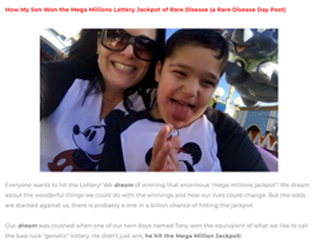
BLOG explaining the rarity of the disease: How My Son Won The Mega Million Lottery Jackpot of Rare Disease.
BELOW PHOTOS
Photos below Tony Sermone, Benjamin Davis, Rolland Egerton-Warburton, and some of the other ADNP syndrome children from the ADNPkids.com website. We can get many more photos and live video of kids if needed for a story.


